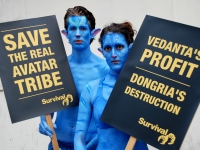Faking Happiness: Activists Strike Back at Vedanta Ad Campaign

Vedanta Resources, a UK based mining and metals company with numerous projects in India, is attempting to claim to be social responsible via a huge advertising campaign. However activists have struck back by effectively using social media tools to counter Vedanta's claims.
"Creating Happiness" - a series of short films about Vedanta that aired on 37 TV channels - was an advertising campaign conceived by India's ad guru Piyush Pandey of Ogilvy & Mather. It was launched earlier this year with a technically slick film that focused on the apparent happiness of Binno, a small girl in Rajasthan, when she discovers that she can get an education from the anganwadis (child day care centres) set up by the company.
The company announced an initiative for students at media and film institutes to produce short films about the company that would then be judged in competition by a heavy-weight jury consisting of Pandey, actor Gul Panag and noted director Shyam Benegal who had championed "art cinema." (Benegal's early films realistically depicted feudal conditions in rural India).
Vedanta was already well known in India but for very different reasons. Several years ago, the company applied for a license to mine for bauxite in the Niyamgiri hills of Odisha and to set up an accompanying refinery. The refinery was set up at Lenjigarh but the manner in which the company flagrantly flouted laws regarding land acquisition and displaced people and did not adhere to environmental norms aroused huge anger among the local population.
In 2010 the license to mine for bauxite was denied after an impassioned protest by these populations and especially by the Dongria Kondhs, an indigenous population, who believe the mountain is their god. The protest was given weight because of a damning report by the high-level Saxena committee that was submitted to the Ministry of Environment and Forests.
Vedanta appealed and the case now rests in the Supreme Court in Delhi.
In March this year shortly after Vedanta launched its public relations campaign, things went off the carefully planned script. A few caustic comments on social networking sites fuelled anger against Vedanta which then went viral.
Kamayani Bali Mahabal, a human rights activist from Mumbai, penned an open letter on the Web to film maker Shyam Benegal whom she hailed as "a voice for the voiceless." The letter appealed to him to pull out of the jury of the competition because "Vedanta is not creating happiness but it is faking happiness." Embedded in the online letter were several videos made by activist Surya Shankar Dash that captured the anger and anguish of the Kondh community.
Critics charged that Vedanta's attempt at burnishing its reputation - spearheaded by Priya Agarwal, the 22 year old daughter of the company's executive chairman Anil Agarwal - had been timed before the crucial final hearing in the Supreme Court on April 9, for Vedanta's appeal to be allowed to mine bauxite. (A decision is expected this August)
An online petition was launched on Change.org to Ambika Soni, the information and broadcasting minister, was launched demanding that the film be pulled from TV, attracting dozens of angry comments and thousands of signatures.
"Vedanta Creating Happiness...this is as true as Iraq having Weapons of Mass Destruction," wrote Sushil Yadav. "It's like Hitler pretending to be Mother Teresa," added Reboni Saha.
Ashok Thurai, another commenter, noted that parallels between Vedanta's action in central India and the film Avatar which pits the (fictional) indigenous Na'vi against the RDA corporation mining for nobatium people on planet Pandora.
Following the activist onslaught, Benegal and Panag withdrew from the jury saying they were unaware of Vedanta's role in the competition. "My bad. Just got full details. I wasn't aware that the competition was past of #vedanta glorification/PR Have pulled out]" tweeted Panag.
Activists also struck back with their own competition asking for creative content on the topic of "Faking Happiness." Blog posts, short films, cartoons and spoofs poured in on Facebook and YouTube that charged Vedanta with falsehoods.
One film - by Nakul Sawhney - focused on disadvantaged young children like Binno whose parents' rights to land, forests and pure water water had been snatched away. It was interspersed with interviews with actual villagers from the Niyamgiri hills like Kurmali Majhi of Simlibhatta who spoke of community lands being acquired by brute force.
Another film - by Manasi Pingle - remixed a Coca Cola jingle and visuals with public data to puncture the myth of "sunshinewali asha" (hope for sunshine). For example the film noted that for every Rs. 6 (12 US cents) that the government spends on health and family welfare, it gives away Rs 95 ($1.90) in tax relief for corporations.
At the end of the day, Vedanta's PR campaign appears to have backfired badly. "(I)t would appear that Vedanta is less the leader in sustainable development and social responsibility in India's universe of corporations, and more the black sheep of that world," concluded novelist Chandrahas Choudhury in an editorial written for Bloomberg.
- 116 Human Rights



